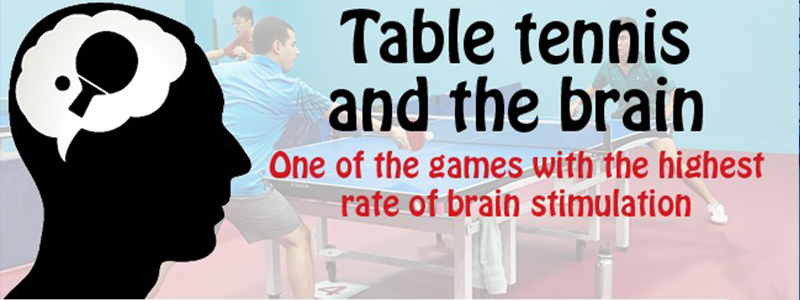Table tennis and the brain are the best combinations to stimulate the brain’s work. Everyone knows that table tennis is a very easy sport to learn. Even a beginner can easily learn to play table tennis within a week.
At the same time, table tennis is also a sport that is beneficial to physical and mental health and social interaction.
The actual theory shows that table tennis also has a stimulating effect on the brain. Most people have a hard time realizing when they are playing. They are already working on their brains, including thinking about how to serve, receive, attack, and defend.
Table of Contents
Best Combination Of Table Tennis And The Brain:
Stimulating brain:
Table tennis is the repetition of a series of offensive and defensive actions, all of which require instinct and intuition to react within 0.5 seconds. It also requires players to guess the opponent’s strategy, predict their actions, and execute them without hesitation.
All of these instincts and intuitions are the result of constantly stimulating your brain during the process of playing table tennis, and you need to be very focused.
In the case of concentration, the actions of the body will mobilize the movement of the primary motor cortex in the brain.
In general, table tennis is a sport that needs to mobilize the whole body, requiring close coordination of the eyes, hands, legs, and brain.
Table tennis and the brain: Enhance memory:
Aerobic exercise can increase the extent of brain-derived neurotrophic factor, which is a protein that enhances nerve development and existence and thus protects against diseases such as Alzheimer’s disease and Parkinson’s disease.
Wendy Suzuki explained that brain cells in the utmost areas of the brain will only die after an individual is born, but will not be reborn.
The hippocampus of the brain is an exception, it will have new brain cells steadily generated after adulthood.
Aerobic exercise can excite the production of additional brain cells and support prolong their existence time.
Therefore, playing table tennis is a good way to promote the production of brain cells. In animal experiments, the promotion of brain cell production is related to many memory refreshing.
Prevent from Alzheimer’s disease:
Playing table tennis also has a therapeutic effect on Alzheimer’s disease. When Alzheimer’s patients play ball, they will exercise extra of their brains to promote their memory function.
After playing, he was energetic, walked faster, and talked a lot. Middle-aged and elderly people may wish to exercise more table tennis to exercise various brain parts and prevent Alzheimer’s disease.
In addition, Playing ping pong also provides people with a social opportunity to “make friends with the ball”, reducing or eliminating the loneliness and depression that people are prone to.
Good communication:
Exercise control:
The brain system undertakes huge, heavy, complicated, and very interesting work in ping-pong. Ping-pong exercise is the high-speed operation and heavy load exercise of the brain system.
The brain, which often runs at high speed and under heavy load, is more sensitive, and the coordination and body’s flexibility are better than ordinary people. This is the result of ping-pong exercise, and it is also proof of the healthy and super-well brain system.
Wendy Suzuki explained that the cerebellum plays a key role in the control of the fine motor. If you play table tennis regularly, the cerebellum and the motor cortex and will change greatly.
This in turn also proves the plasticity of the brain, that is, the brain can change according to personal environmental factors and experience.
Concentrate:
Table tennis and the brain enhance your concentration power. The size of table tennis is small and the action speed is fast. People need to retain their eyes on table tennis and quickly predict what will take place next, which is helpful to improve people’s concentration.
Because of its small ball and small table, ping-pong has relatively low physical requirements. Therefore, 5-year-old children can fight, as can elderly people in their 70s. But it requires relatively high skills and intelligence. The skill of ping-pong is an external manifestation of intelligence or visible intelligence.
There are usually only two people playing table tennis. Its essence is a contest of intelligence between the players of both sides. The information observed by the eyes and the information heard by the ears must be quickly transmitted to the brain.
After the brain judges, thinks, and makes decisions, combat commands are issued and executed by various parts of the body such as the feet, legs, waist and hips, shoulders, elbows, arms, wrists, and fingers.
Improve emotions:
Any aerobic exercise can play a role in improving mood, which is the most obvious effect of exercise. Because it will increase the level of nerve mediators in the human body, and depression will cause the level of nerve mediators to decrease.
Young people learning to play table tennis can improve their coordination, reaction sensitivity, gradually develop good habits that are willing to use their brains, and promote metabolism.
Studies have shown that children who insist on playing table tennis for a long time have higher self-confidence and agility in thinking than average children.
Training the nervous system response:
- Playing table tennis can train the brain’s thinking and judgment ability, and the body’s secondary reflex action speed after thinking.
- Calm your mind and control the intensity. Middle-aged and elderly people can also play table tennis, but it’s best to focus on fitness, play fewer games, and don’t get upset because of winning or losing gambling, regardless of intensity, people with poor heart function should pay special attention to it.
- Third, to strengthen the brain. Help prevent senile dementia, delay cerebral arteriosclerosis in the elderly, and maintain thinking and memory.
